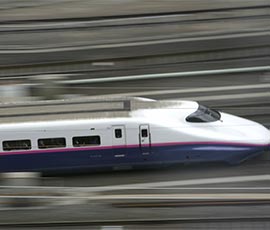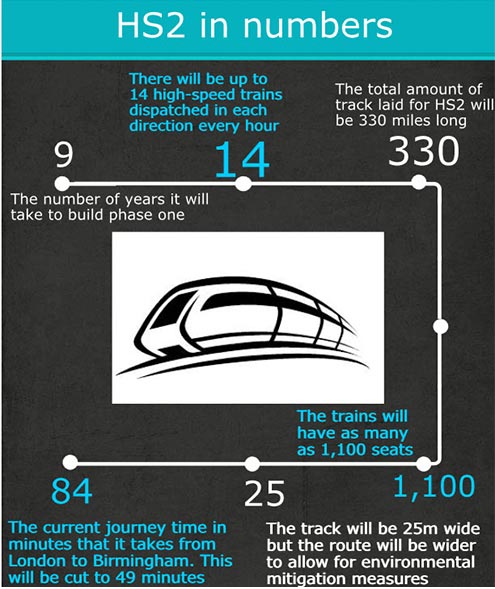HS2 uncertainty stifling farm investment

The uncertainty hanging over the proposed £42.6bn High Speed 2 project (HS2) is stifling investment in farm businesses according to those affected by the scheme.
Government projections of a £15bn annual boost to the economy are of little comfort to rural communities who are already counting the cost of the scheme in terms of land take, depressed property values and years of business disruption.
Phase one of the project, taking commuters from London to Birmingham in 49 minutes, will begin construction in 2017 if legislation passes through Parliament as planned. Much is to be decided before then, not least how the 160 farms affected by phase one alone will be compensated.

It will link London with Birmingham and the North at a cost of £42.6bn
Construction is due to begin in 2017 with passengers beginning to travel to Birmingham in 2026
Work on phase two, extending the line to Manchester, Sheffield and Leeds, will be completed in 2032
160 farms are affected in phase one alone
THE TIMESCALE
A High Speed Rail Preparation Bill was passed by MPs this month, releasing funds to pay for site surveys and compensation to evict affected residents
The next key development will be in early December when a Hybrid Bill is read in Parliament. If passed, it will essentially grant the government permission to acquire land and build the route
At the same time, the final environmental statement will be published, detailing the amount of land take and mitigation measures being adopted
It’s expected that in March 2014 the Hybrid Bill will reach committee stage, when groups and individuals can petition government about the HS2 on matters such as compensation and property bond schemes
Robert Lockhart
Robert Lockhart stands to lose about 15% of his 280-acre cereals and potato enterprise in Drayton Bassett, Staffordshire.
Mr Lockhart doesn’t know whether he will be fairly compensated. Until the route and the amount of land that has to be taken is confirmed – expected in the next month – he lives with the uncertainty.
“If they move the line anywhere between Middleton and Drayton Bassett it will go across my farm – any tweak means I’m still affected, so you have to get on with it and do the best you can for your farm, your family and your future.”
It’s not solely the compensation that concerns Mr Lockhart. He predicts a land grab at inflated prices as affected businesses look to replace what they’ve lost.
“When you lose 40 acres from 280, that’s a significant proportion of your business and has an adverse effect on your overheads,” he said. “We’re just outside Birmingham and there are 10 or 15 other farmers who are in the same position and they’ll all be scrambling around for the next field that becomes available.
“You want to secure a future for the business. I’m 60 and this has all come at a very difficult time.”
The Barnes family
The Barnes family has farmed at Packington Moor near Lichfield for more than a century, but the business stands to be wiped out by HS2.
The proposed line travels straight through the family home and farm shop as well as the wedding venue which helped John Barnes win the title of 2011 Farmers Weekly Awards Diversification Farmer of the Year.
“We stand to lose everything,” Mr Barnes said. “As a family it’s difficult to be motivated day to day, but as a business we have to rise above it because the farm shop and particularly the wedding venue need us to be upbeat all the time.”
More than 100 couples a year tie the knot on the site and the family wants to expand the operation, but is weighing up whether to rebuild elsewhere or move out if the planned HS2 route goes ahead.
The 700-acre estate, which is half owned and half rented, will be split in half if the proposed route gets the green light, making it difficult to continue to access the land where the family grows oilseed rape, wheat, potatoes, parsnips and soft fruit.
“It’s the uncertainty of it that’s the worst bit. If we knew definitively either way then we could plan – we’ve got to the stage in our business that we need to develop and we’re having to hold back,” Mr Barnes said.
John Jakobi
Further down the line in Stoke Mandeville, Buckinghamshire, John Jakobi estimates that the tracks running just 150m from his Grade II listed farmhouse will cost him around £1m in lost property value.
A huge maintenance loop, which would be built parallel to the track, will also sit on the edge of his land with the main line hurtling alongside the 230-acre estate.
“We were dead against HS2 anyway,” Mr Jakobi said, “But then we saw the plans for where it is going to go.”
The situation could have been even worse, as the original route saw proposals for a road, designed to ease congestion caused by HS2, to be built over his land, requiring the demolition of two of his cottages. But a mitigation proposal has been submitted which should save the properties.
The wheat, barley, oilseed rape and grassland enterprise is supplemented by the income from the cottages.
“We’re looking at the value of the farmhouse depreciating by £1m and the government may not pay compensation until three years after the line is up and running – I’ll never live to see that,” Mr Jakobi said.
“HS2 won’t kill the farming activity because the work is contracted out but we will become less profitable as a result of the line,” he said.
CLA chief surveyor Andrew Shirley says his two key lobbying goals are to secure a fair compensation package for affected farmers and a duty of care obligation, which should be followed by HS2’s constructors once land has been acquired.
He’s pushing for a property bond scheme which would see the government guaranteeing the value of buildings to remove the uncertainty of sales made on the open market.
“The scheme would frontload everything so farmers know early on that they could access money to reinvest in land and buildings to replace what is lost,” he said.
The CLA also wants to see more consideration given to the impact that construction will have on the land once it has been acquired, something that has been “of secondary or no importance” up until now.
But Mr Shirley said that it’s the uncertainty that’s causing the most stress, stifling investment and business development.
“From the time politicians first started talking properly about HS2 – before the last election – to the time it’s actually completed is a generation of farmers. You could have this disruption and uncertainty hanging over you for 30 years. There will be people who have an ordeal to keep their business going by not being able to invest and modernise.”
The execution of HS2 will be watched closely by those who remember the construction of the first high-speed rail link through the Kent countryside.
In his capacity of NFU county secretary, and subsequently regional director, Shaun Leavey gave evidence to MPs and Lords in the 1980s and 1990s to ensure farmers were treated fairly for their inconvenience.
“A lot of time and effort went in to put pressure on that created a political and commercial environment which made it difficult for farmers to be short-changed,” he told Farmers Weekly.
“The key to HS2 is the compensation and landworks. If it’s being done with the appropriate budget to make it possible to farm either side of the line – including good-quality fencing, bridges and noise reduction – then it may well be justifiable in 20-30 years’ time.”
Andrew Barr has lived with HS1 running through his livestock and arable enterprise at East Lenham Farm for more than a decade.
He said the disruption caused during the railway’s construction was considerable but his worst fears have not been realised in the long run.
“We are still sorting out tiny little parcels of land left by the track carving through the land,” he said. “And there were endless negotiations over the compensation – perhaps if they had offered slightly over market value for land and buildings then it would’ve saved a huge amount of money on solicitors and land agents’ fees.”
The farm lost about 90 acres of contracted land, some of which Mr Barr has managed to get back, but it was the disruption caused during construction that was the biggest headache.
“There was a lot of heavy machinery and the land’s never recovered. It completely ruined all soil structure and some bits have just had it.”
However, Mr Barr says that the value of two of his cottages recovered “as people realised HS1 wasn’t as bad as they thought it was going to be”.
He says the noise from the track is less intrusive than the old railway which also passes through his land.
